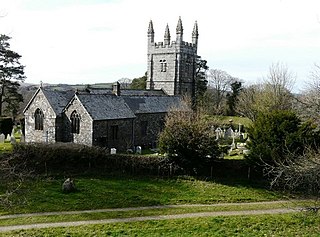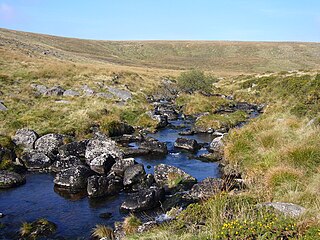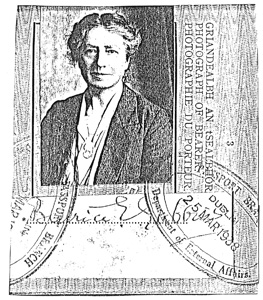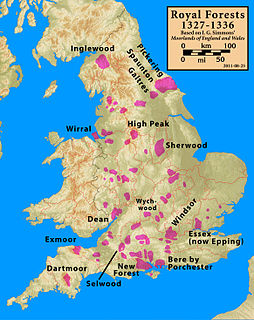External links
| This article related to the history of the United Kingdom or its predecessor states is a stub. You can help Wikipedia by expanding it. |
The Gubbins band was a group of footpads, sheep-stealers, beggars, cutpurses, cut-throats and highwaymen who inhabited the area around Lydford in Devon around the time of the English Civil War. Their leader, one Roger Rowle, has been variously characterised both as a blackhearted villain and as the Robin Hood of Dartmoor. The Gubbins band is depicted in Charles Kingsley's novel Westward Ho! . They also appear in the novel Warleigh by Anna Eliza Bray.
| This article related to the history of the United Kingdom or its predecessor states is a stub. You can help Wikipedia by expanding it. |

Devon, also known as Devonshire, is a county of England, reaching from the Bristol Channel in the north to the English Channel in the south. It is part of South West England, bounded by Cornwall to the west, Somerset to the north east, and Dorset to the east. The city of Exeter is the county town. The county includes the districts of East Devon, Mid Devon, North Devon, South Hams, Teignbridge, Torridge, and West Devon. Plymouth and Torbay are each geographically part of Devon, but are administered as unitary authorities. Combined as a ceremonial county, Devon's area is 6,707 km2 and its population is about 1.1 million.

Lydford, sometimes spelled Lidford, is a village, once an important town, in Devon, seven miles (11 km) north of Tavistock on the western fringe of Dartmoor in the West Devon district. There is an electoral ward with the same name which includes Princetown. The population of this ward at the 2011 census was 2,047.

Devon is a county in south west England, bordering Cornwall to the west with Dorset and Somerset to the east. There is evidence of occupation in the county from Stone Age times onward. Its recorded history starts in the Roman period when it was a civitas. It was then a separate kingdom for a number of centuries until it was incorporated into early England. It has remained a largely agriculture based region ever since though tourism is now very important.

Okehampton railway station is a railway station serving the town of Okehampton in Devon, England. Heritage train services currently operate on certain weekdays, weekends and bank holidays. A service from Exeter operates on summer Sundays as part of the Dartmoor Sunday Rover network.

Bere Ferrers station on the Tamar Valley Line is situated near the village of Bere Ferrers in Devon, England. The station is on the former Southern main line between Exeter and Plymouth via Okehampton. It is currently operated by Great Western Railway (GWR).

Lydford Castle is a medieval castle in the town of Lydford, Devon, England. The first castle in Lydford, sometimes termed the Norman fort, was a small ringwork built in a corner of the Anglo-Saxon fortified burh in the years after the Norman conquest of England. It was intended to help control Devon following the widespread revolt against Norman rule in 1068. The Norman fort had been abandoned by the middle of the 12th century.

The Lyd is a river rising at Lyd Head in the Dartmoor national park in Devon in South West England and flowing into the River Tamar beyond Lifton. This is the deepest gorge in South West of England.

The West Dart River is one of the two main tributaries of the River Dart in Devon, England.

Lydford railway station was a junction at Lydford between the Great Western Railway (GWR) and London and South Western Railway (LSWR) situated in a remote part of north-west Dartmoor in Devon, England.

Sampford Courtenay railway station is a railway station at Belstone Corner serving the nearby village of Sampford Courtenay in Devon. The village lies 3 minutes away by car or around 30 minutes by foot via the B3215. In 2018/19 it was the least used station in Devon and in the South West and the tenth least used station in Great Britain.

Bow railway station was a railway station serving the town of Bow and the hamlet of Nymet Tracy in Devon. Bow lies about 8 miles west of Crediton.

The A386 is a primary route in Devon, England. It runs from Plymouth on the south coast to Appledore on the north coast.

Beatrice Edith Gubbins was an Irish watercolour artist and traveller.

Hexworthy is a hamlet on Dartmoor, in Devon, England. It lies on the West Dart River a mile upstream from Dartmeet. Historically in the parish of Lydford, since 1987 it has been in the civil parish of Dartmoor Forest.

The O Brook is a short tributary of the West Dart River on Dartmoor in Devon, England. It lies near the village of Hexworthy, and the lower part of the stream forms the boundary between the parishes of Holne and Dartmoor Forest. An earlier form of the name was Ocbroke, and it may mean "Oak Brook", although oaks are rare in the area.
Dartmoor Forest is a civil parish in Devon, England. It was formed in 1987 by the splitting of the former parish of Lydford. It covers about 56,000 acres (230 km2) entirely within Dartmoor National Park, and is the largest parish in Devon. Despite its size its population in 2001 was only 1,619. Due to its large size it is surrounded by many other parishes: these are, clockwise from the north, Belstone, South Tawton, Throwleigh, Gidleigh, Chagford, North Bovey, Manaton, Widecombe in the Moor, Holne, West Buckfastleigh, Dean Prior, South Brent, Ugborough, Harford, Cornwood, Shaugh Prior, Sheepstor, Walkhampton, Whitchurch, Peter Tavy, Lydford, land common to the parishes of Bridestowe and Sourton, and Okehampton Hamlets.

The Forest of Dartmoor is an ancient royal forest covering part of Dartmoor, Devon, England.
Gubbins is a surname. Notable people with the surname include:

The Granite Way is a route of 18 km consisting mainly of a motor traffic-free cycle/walkway between Okehampton and Lydford. It was built by Devon County Council (DCC) and is part of the National Cycle Network (NCN) Route 27 ‘Devon Coast to Coast’ between Ilfracombe and Plymouth. It is maintained jointly by DCC and Sustrans. Currently, the Way is supported by a Sunday-only train service during summer months to and from Okehampton railway station providing links to nearby Exeter run by DCC and Great Western Railways.
Sharp Tor is a common name given to tors (outcrops), particularly on Dartmoor and Bodmin Moor. All the "Sharp Tors" are listed below with their location and height: